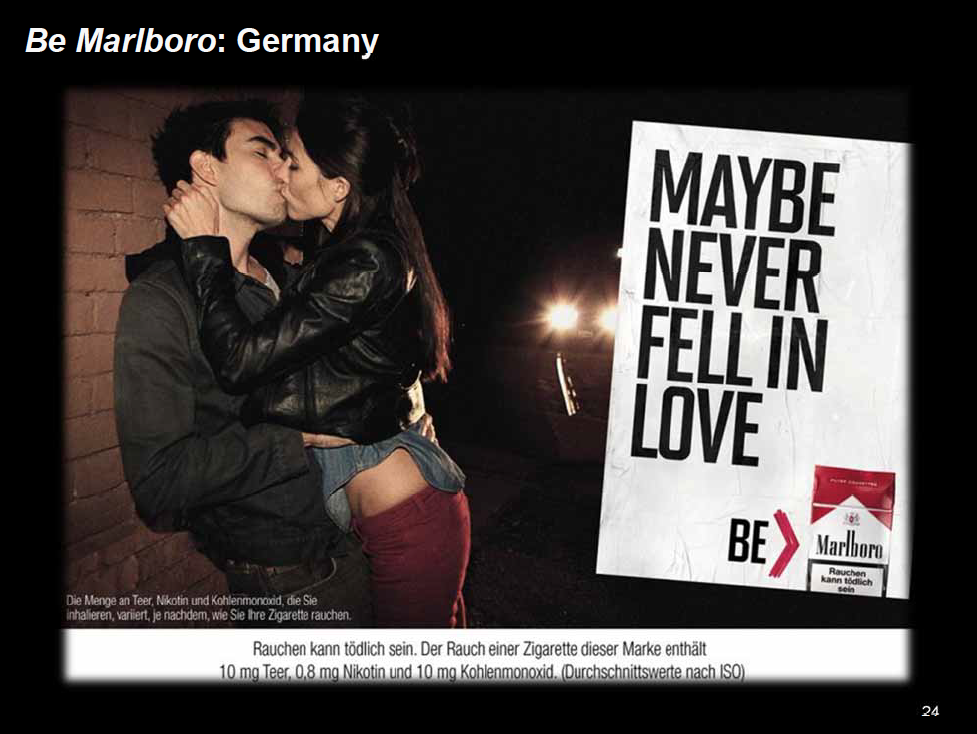
The Marlboro Man is dead, but the Campaign for Tobacco-Free Kids and other anti-smoking advocacy groups released a report Wednesday that says that the cigarette brand, owned by Philip Morris International, is actively targeting minors in an international ad campaign that has been banned in at least one abroad market.
The campaign, which the report says cost close to $7 million, shows various seductive images with a similar trope: a young woman pressing against a man in an alley (“Maybe never fell in love”), a guy hopping a chain link fence (“Maybe never found a way”), and a musician in a smokey haze laughing and playing a guitar (“Maybe never wrote a song.”) The message of the ads? Shake off inhibitions. “Don’t be a maybe… Be Marlboro.”
While the ad campaign hasn’t been used in the United States, which has very strict laws against gearing tobacco ads to children, it has appeared in more than 50 countries.
“These ads use images that directly link Marlboro with the exact attributes adolescents across the globe seek,” Matthew L. Myers, President of the Campaign for Tobacco-Free Kids which helmed the report, told TIME. “Sexual and social success, independence and rebellion against authority, risk taking.” He equated the cool persona embodied in the ad campaign to that of the Marlboro man — although these images appeal to a more current, hipster-friendly young audience.
Marlboro denied the ad campaign directly targets minors. “Our Marlboro campaign, like all of our marketing and advertising, is aimed exclusively at adult smokers and is conducted in compliance with local regulations and internal marketing policies,” Philip Morris International spokesperson Iro Antoniadou told TIME in an email. “Allegations to the contrary are unfounded and based on a subjective interpretation.”
A German court found otherwise. The “Be Marlboro” ad campaign was banned throughout the country in October for targeting teenagers and adolescents.
“In Germany, regional authorities in Munich have issued an order that lacks any basis in law and fact banning our Marlboro campaign,” Antoniadou said. “As a result, Philip Morris Germany (PMG) is challenging it before the Munich Administrative Court.”
According to the report, titled You’re the Target: “While tobacco companies claim publicly that they do not market to youth or design marketing campaigns that target them, a 2013 study conducted in low- and middle-income countries showed that 22% of five- and six-year-olds surveyed were able to correctly identify Marlboro cigarettes, the world’s best-selling cigarette brand.”
“The real tragedy of this entire campaign is that it’s running in countries with the weakest laws, the most vulnerable populations where the governments haven’t stepped in to protect their children,” Myers said, citing Indonesia, the Philippines, China, and Russia as examples. “As an industry it reminds me of a 2-year-old before their moral compass develops.”
While Myers doesn’t expect the report to change Philip Morris International’s marketing strategy, he does hope it will encourage other countries to have stricter advertising laws for cigarette companies.
Marlboro reiterated that its marketing policy strictly prohibits using images “that are aimed at or have particular appeal to minors.” In a June 21, 2012 investor’s day meeting, Philip Morris International senior vice president of marketing and sales told an audience that the controversial campaign— which launched in 2011 but is ongoing—was aimed at young adults:
We know, for example, that young adults feel overwhelmed by the flood of information and options that new technologies offer. In this time of uncertainty, they have very few life compasses that can provide them with guidance. With the new campaign, Marlboro encourages them to be decisive, trust themselves and follow their inspiration. The concept is very simple: there are three ways to react when faced with a decision: Yes, No, or Maybe. Marlboro does not believe in Maybes.
More Must-Reads from TIME
- Where Trump 2.0 Will Differ From 1.0
- How Elon Musk Became a Kingmaker
- The Power—And Limits—of Peer Support
- The 100 Must-Read Books of 2024
- Column: If Optimism Feels Ridiculous Now, Try Hope
- The Future of Climate Action Is Trade Policy
- FX’s Say Nothing Is the Must-Watch Political Thriller of 2024
- Merle Bombardieri Is Helping People Make the Baby Decision
Contact us at letters@time.com